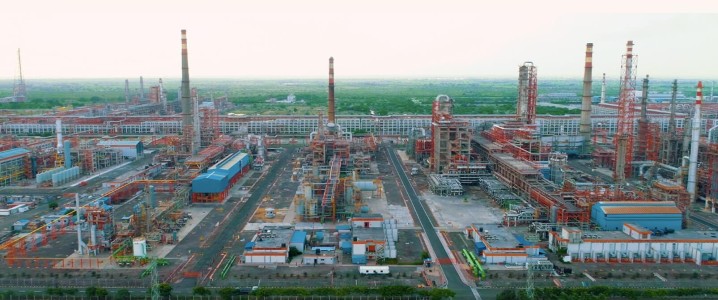Business
Nayara Energy Adapts to EU Sanctions by Shifting Focus to Domestic Market

Private Indian refiner Nayara Energy faces significant challenges following its inclusion in the European Union sanctions on July 20, 2023. These sanctions are part of the EU’s 18th sanctions package and are linked to Rosneft, which holds a 49% stake in Nayara. The sanctions prompted the resignation of CEO Alessandro Dorides, with Sergey Denisov, a Russian-born executive, stepping in as his successor. This leadership change reflects the direct impact of the sanctions on the company’s operations.
Nayara operates the Vadinar refinery in northwest India, which processes 400,000 barrels per day (b/d) and has historically focused on exports. State-owned refiners in India are mandated to prioritize the domestic market, making Nayara’s reliance on exports particularly notable. Since Rosneft‘s $13 billion investment in 2017, which was the largest foreign investment in India at that time, the Vadinar refinery has predominantly processed Russian crude oil. This connection is now central to the EU’s sanctions strategy.
Despite the sanctions, the EU has not historically represented Nayara’s primary export market. The United Kingdom has been the main destination for jet fuel from Vadinar, and, as of now, there are no restrictive measures against Nayara from London. Data from Kpler indicates that in 2023, nine of the nineteen tankers bound for Europe went to the UK, while in 2024, this number dropped to four out of eight. By 2025, shipments to Europe represented only about 5% of total output.
As the EU sanctions take effect, Nayara is pivoting towards Asian markets. In July, the refinery saw eight tankers loaded with refined products, with four heading to the UAE, one to Oman, two to Singapore, and one to Pakistan. The shipments to the UAE were directed to both Jebel Ali, serving Dubai’s domestic market, and Fujairah, a key transshipment hub that facilitates discreet rerouting to markets such as East Africa. Oman’s Sohar port also offers similar flexibility, enabling the transshipment of cargoes due to the concentration of anchored tankers.
Nayara’s strategy to redirect its exports is supported by Singapore’s robust trading environment, where price and availability often take precedence over origin. This shift allows Nayara to continue finding buyers for its discounted cargoes, despite moving away from its traditional European routes.
While the Asian pivot may provide immediate relief, Nayara is aware of the long-term implications. The refinery’s ability to maintain export volumes will be challenged by rising freight and logistical costs, prompting a stronger focus on the domestic market. In response to these challenges, Nayara has sought support from the Indian government, including potential sales through state-owned enterprises.
Reliance Industries, India’s largest public company, has been mentioned as a possible buyer for Nayara’s products. However, Reliance operates the world’s largest refinery in Jamnagar, which has a capacity of 1.24 million b/d, making it more likely to capture displaced demand rather than act as a lifeline for Nayara. The strained dynamics between these two major refiners, both located in Gujarat, complicate the situation further.
Recognizing the domestic market as a more reliable source of revenue, Nayara’s extensive network of over 6,500 retail stations positions it well to absorb a greater share of its output. Previously a strategy for growth, this retail expansion may now serve as a protective measure against external pressures. If the EU’s sanctions remain in place and alternative export hubs become saturated, Nayara’s domestic market could shift from a supplementary role to a central lifeline, allowing the company to sustain profitability.
However, the success of this shift will depend on securing feedstock and maintaining cash flow. In the fiscal year 2024-2025, Russian Urals crude constituted about 90% of Nayara’s refinery runs, equating to approximately 366,000 b/d. Since the sanctions were enacted, crude arrivals have significantly decreased, with July shipments totaling just 3 million barrels, all from Russian sources. Despite these declines, there are indications that Rosneft will continue to supply Nayara, ensuring some level of operational continuity.
As Nayara Energy navigates these tumultuous waters, its ability to adapt to the changing landscape will be crucial for its survival and growth in a highly competitive and politically charged environment.
-

 Politics4 weeks ago
Politics4 weeks agoSecwepemc First Nation Seeks Aboriginal Title Over Kamloops Area
-

 World5 months ago
World5 months agoScientists Unearth Ancient Antarctic Ice to Unlock Climate Secrets
-

 Entertainment5 months ago
Entertainment5 months agoTrump and McCormick to Announce $70 Billion Energy Investments
-

 Science5 months ago
Science5 months agoFour Astronauts Return to Earth After International Space Station Mission
-

 Lifestyle5 months ago
Lifestyle5 months agoTransLink Launches Food Truck Program to Boost Revenue in Vancouver
-

 Technology3 months ago
Technology3 months agoApple Notes Enhances Functionality with Markdown Support in macOS 26
-

 Lifestyle3 months ago
Lifestyle3 months agoManitoba’s Burger Champion Shines Again Amid Dining Innovations
-

 Top Stories2 months ago
Top Stories2 months agoUrgent Update: Fatal Crash on Highway 99 Claims Life of Pitt Meadows Man
-

 Politics4 months ago
Politics4 months agoUkrainian Tennis Star Elina Svitolina Faces Death Threats Online
-

 Sports5 months ago
Sports5 months agoSearch Underway for Missing Hunter Amid Hokkaido Bear Emergency
-

 Politics5 months ago
Politics5 months agoCarney Engages First Nations Leaders at Development Law Summit
-

 Technology5 months ago
Technology5 months agoFrosthaven Launches Early Access on July 31, 2025





















